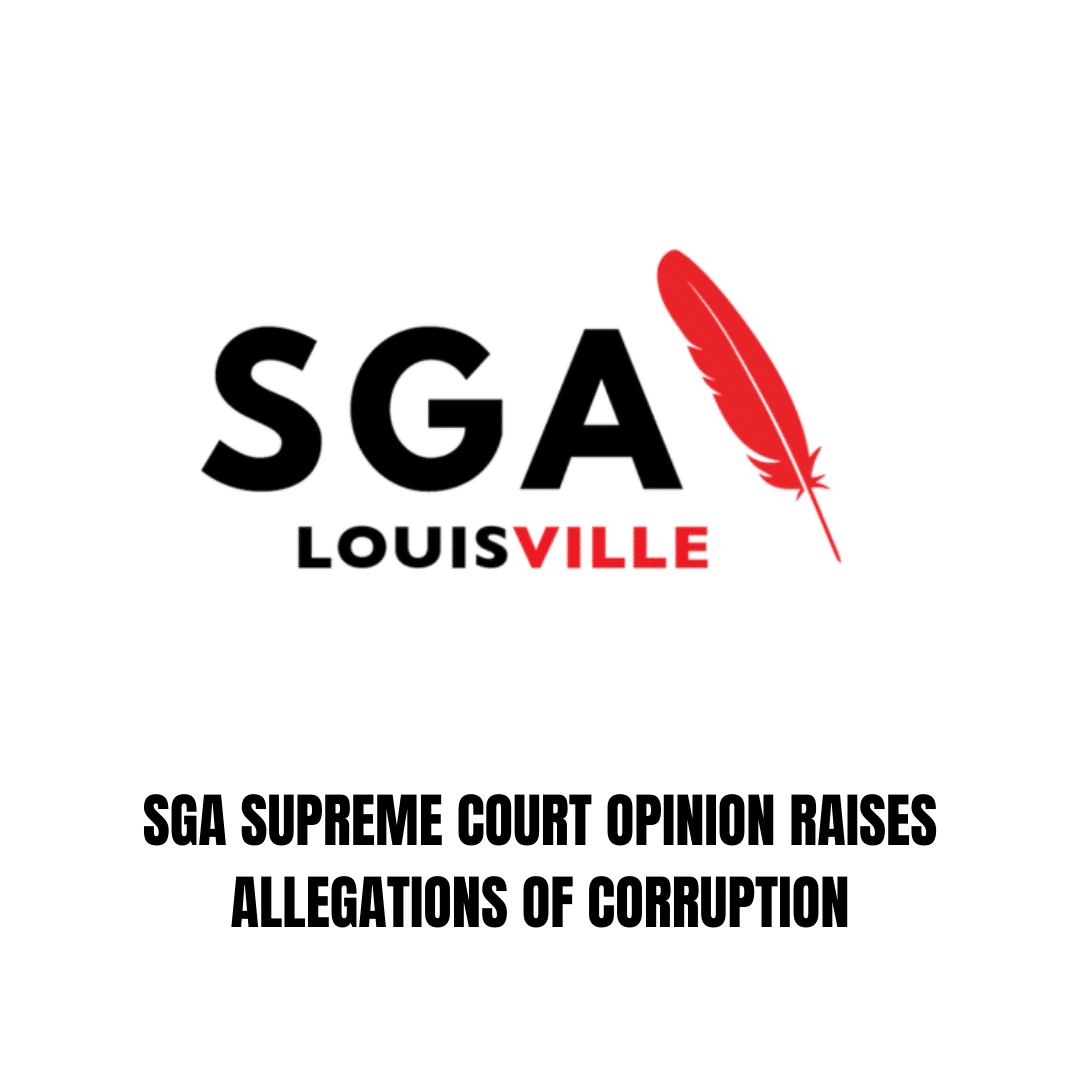By Madelin Shelton and Joe Wilson —
The Student Government Association at U of L is facing backlash after the SGA Supreme Court handed down a decision overturning the unofficial results of this year’s elections.
The Court’s opinion changed the outcome of the student body president election, in which candidate Dorian Brown originally came in first. Due to alleged election violation sanctions issued after election-related hearings, Brown has been declared by the Court to have come in second behind candidate Sydney Finley. The opinion also declared that the race for executive vice president will move to a run-off.
Of the controversy as a whole, Liam Gallagher, a sophomore political science student who served as the counsel for the Brown/Hayden ticket during the hearings said, “This election will go down in the history of U of L as one of the worst displays of executive overreach we’ve ever seen.” He continued, “If the university refuses to take action, we will take action outside of the university.”
Finley also gave her take on the situation. “A lot of the information circulating around only presents partial evidence or information that is being used to support false assumptions.” She continued, “It’s unfortunate that people are sending threats and hate messages over something that truly did not happen. There is much more at play here, and I am hoping that with the release of the suit packets by LPR, students will begin to see this whole thing is a concerted effort to confuse students from the truth.”
A bombshell article from the Louisville Political Review, a nonpartisan, undergraduate-run, online magazine, alleged claims of corruption among the current SGA Top 4 and Supreme Court, along with deliberately breaking the SGA Constitution during the election hearing proceedings. The Louisville Cardinal has investigated these and other claims to evaluate their merit. Below are the findings:
From an email obtained by The Louisville Cardinal, Brown and his running mate, Katie Hayden, were notified by the SGA Supreme Court on March 21 that Finley filed an election Violation Notification Form, alleging six election violations against Brown/Hayden. SGA Supreme Court Chief Justice Jacquelyn Gesser requested Brown and Hayden be present two days later, on March 23, for a pretrial hearing.
However, Section 5.7.6 of the SGA Constitution states that, “The Supreme Court may order all parties to appear before it no less than fourteen (14) days from the time of service for a pretrial conference.” This points to a violation of the SGA Constitution by the Supreme Court.
In its opinion, the Court decided that each election violation would result in a three percent deduction, or sanction, from a candidate’s original vote total.
The original Court’s decision found the Brown/Hayden ticket to be guilty of two out of the original six claims brought by Finley/Brooks. However, the Court cited seven election-related violations against Brown/Hayden. In addition to two sanctions for claims listed in Finley’s original suit, the SGA Supreme Court conducted its own search and cited five other election violations allegedly committed by Brown/Hayden. The Court did not issue sanctions on Finley/Brooks for any allegations outside of those brought forth by Brown/Hayden.
Traditional courts typically do not bring in outside evidence. Standard practice calls for the counsel of both the plaintiffs and the respondents to provide evidence, then the courts evaluate only the evidence brought before them.
Gallagher said his clients were unaware of these five allegations until the Court’s opinion was handed down April 8. Therefore, the Brown/Hayden ticket was not presented with an opportunity to provide a defense against these five allegations during the election hearings.
When asked if there was SGA Supreme Court precedent of the justices bringing in outside evidence, Gallagher said, “We don’t have precedent. So I requested on three different occasions the precedent of the Court. All three times they said either we’re working on it or we can’t find it.”
In Section 5.7.8 of the SGA Constitution, it says, “A compilation of all decisions of the Supreme Court shall be kept in the SGA office and online and made available to all students.” However, The Louisville Cardinal was unable to locate any records of Supreme Court precedent on the SGA website.
Despite a lack of public records, Finley’s original suit against Brown/Hayden references SGA Supreme Court precedent.
Finley spoke with The Louisville Cardinal about the situation and said that the reference didn’t come from possession of a physical copy of such precedent. “This is because the information on the previous precedent was learned through communication with past SGA officers from previous years who have encountered similar situations pertaining to the claims we filed,” she said.
The Louisville Political Review’s article claims Finley, as the executive vice president in the current Top 4 administration, is “constitutionally responsible” for the upkeep of SGA Supreme Court precedent records according to the SGA Constitution.
The Louisville Cardinal finds this to be incorrect, as Finley is responsible for compiling and maintaining records for the Executive Branch of SGA. The Supreme Court makes up the Judicial Branch of SGA.
During the post-election campaign lawsuits, Eli Cooper, the current services vice president and a fellow member of Top 4 alongside Finley, acted as counsel for the Finley/Brooks campaign. Gallagher said this represents a clear conflict of interest. In response to this claim, Finley said in a statement, “It can be argued that some of the witnesses (from both parties) listed in the now public suit packet are ‘conflicts of interest.’ In a situation like this, you must use your best judgment as to when to separate professional opinions or actions from external leadership endeavors. Eli never once utilized his position as SVP to aid in this case in any way.”
It should be noted that Gallagher is involved in SGA as a senator and was recently elected as the next College of A&S president.
Similarly, current SGA President Ugonna Okorie acted as an eyewitness for Finley/Brooks, which Gallagher also says represents a conflict of interest. In response, Finley pointed to the fact that the Court did not rule in favor of any of the Finley/Brooks claims in which Okorie served as an eyewitness. She also said that in these hearings, the Court judges whether the parties involved are acting in good faith. Under that standard, the Court determined that Okorie’s involvement in the hearing was permissible.
The allegations against the current Top 4 and the Supreme Court has resulted in widespread backlash across campus. The U of L College Republicans and Young Democrats released the following joint statement:
“The U of L College Republicans and Young Democrats wholeheartedly condemn the undemocratic actions of the SGA Supreme Court and the current Executive Branch regarding the outcome of the most recent SGA election. These individuals have directly hindered the democratic process at U of L and proper actions should be taken immediately to reverse this wrongdoing.”
In addition, a petition titled “Protect democracy at the University of Louisville before it’s too late” is circulating online with over 250 signatures. It asks signees to protect democracy by showing support for the Louisville Political Review’s article and calls for accountability over the elections.
SGA Supreme Court Chief Justice Jacquelyn Gesser did not respond to a request for comment.
File Graphic // The Louisville Cardinal





